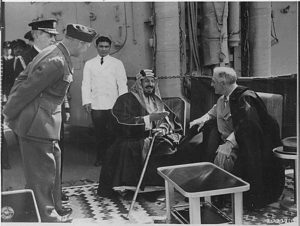Last year, Bill Maher and Ben Affleck had a major argument about Islam and Muslims on HBO’s Real Time unveiling that Islamophobia is not exclusive to conservatives or liberals. Although the American political right, its outpost at Fox News, and the Republican Party have made their antipathy to Islam and Muslims overtly known; liberals also carry more muted fears and anxiety as well. Bill Maher consistently exposes his intolerance including his recent statement to Fareed Zakaria stating, “Let’s not pretend the things that ISIS believes are not things that many millions, tens of millions, hundreds of millions of Muslims believe around the world.” The perpetuation of such false narratives are consistent with messages that I have observed in the American political left on college campuses, by politicians and in media.
I have been speaking around the United States on Islamophobia for years after being asked by a colleague to present on the topic at an anti-racism conference made up of mostly social justice educators. After the presentation, I was shocked that a room full of anti-racism educators knew close to nothing about the topics of Islam and Islamophobia. Upon realizing that people who had dedicated their lives to confronting racism (and educating others about it) knew nothing about the topic, I realized and was disturbed by the scale of the problem.
In traveling around the country to speak on this topic, my understanding of the depths of the ignorance deepened through encounters with people across a variety of political perspectives who carried deep antipathy and prejudices towards Islam and Muslims. People sometimes ask, ‘why is confronting a religion and its followers racist?’ It is because in the United States, Islam and Muslims are perceived as non-white and therefore translates into prejudices held towards people who are racialized into categories that even include non-Muslims such as Sikh-Americans who have disproportionately subjected to Islamophobic hate crimes in post-9/11 America.
The American media typically lacks any notable Muslim representation when discussing Islam or Islamophobia while many preach that we don’t speak out against radicals. The sole Muslim who is typically called upon is religion scholar Dr. Reza Aslan who typically provides critically important information about diversity within Islam and radicalism that exists across many faith traditions. However, Dr. Aslan’s voice is not enough and he should not carry this burden by himself. We must also interrogate and critique American foreign policies and interventions in predominantly Muslim regions of the world as a continuation of a colonial process that started prior to American interventionism. We have to go back about 100 years ago when the British empowered the “House of Sa’ud” and their rigid interpretation of Islam in exchange for access to oil.

US President Franklin D. Rosevelt meets with King Abdullah Aziz of Saudi Arabia in 1945 aboard the USS Quincy, in the Great Bitter Lake of the Suez Canal
What most Americans don’t realize is that the vast majority of Islamic civilizations were relatively progressive, pluralistic and inclusive societies (respectful of religious and ethnic minorities) that were perceived by the West and the Church as a threat to European domination.
If anything, the main source of violence, intolerance and inhumanity in the world came from Christian civilizations (Crusades, Atlantic Slave Trade, anti-Semitism, etc.). From its inception in the 7th Century AD, Muslim women had the right to vote and rights such as property ownership that were unprecedented and non-existent in Western societies until the 20th Century.
 Meanwhile, Mecca was a vibrant place of trade among people from around the world exchanging more than just goods. People wrestled with profound spiritual questions while sharing stories and culture across vast lands with one another. However, the Saudis ended this dynamic by imposing their brand of Islam that is restrictive and limited. This once vibrant place of exchange has now become a place in which scholars are killed for challenging their ideology. What makes matters worse is that the Saudis perpetuate their interpretation of Islam around the world by building schools and giving away free materials to propagate their ideology.
Meanwhile, Mecca was a vibrant place of trade among people from around the world exchanging more than just goods. People wrestled with profound spiritual questions while sharing stories and culture across vast lands with one another. However, the Saudis ended this dynamic by imposing their brand of Islam that is restrictive and limited. This once vibrant place of exchange has now become a place in which scholars are killed for challenging their ideology. What makes matters worse is that the Saudis perpetuate their interpretation of Islam around the world by building schools and giving away free materials to propagate their ideology.
It is this interpretation of Islam that Bill Maher is confronting but then applies to the vast majority of Muslims in the world. He also doesn’t acknowledge that it is our cozy relationship with Saudi Arabia that creates an unholy alliance between the United States and “fundamentalist” Islam. It is this interpretation of Islam that the U.S. has empowered in places like Afghanistan where groups of Saudis flocked to and started al-Qaeda and the Taliban funded by the U.S. taxpayer. We are the reason that women were forced into wearing burqas and prevented from having education (two things that have no Islamic basis). Prior to that, Afghanistan was originally created by the British as a “buffer state” because they didn’t want their empire’s crown jewel of India to share a boarder with China.
Then there’s Iraq; where the United States has been involved for over 30 years. Empowering and funding Saddam Hussein and encouraging him to invade Iran resulting in an 8 year war in which the U.S. armed from both sides. Saddam then reclaimed Kuwait which had once been carved out from Iraq by the British for its oil and ports. Saddam never imagined U.S. allies would invade Iraq, followed by crippling sanctions and later an occupying second invasion. Let’s also not forget that Iraq was strategically created through ‘divide-and-conquer’ methods forcing Sunni Kurds (who were split across 5 countries due to colonial-drawn boarders), Sunni Arabs and Shi’a Arabs to share a country with a U.S.-backed Saddam brutally dominating them. When George W. Bush stated that we needed to “maintain the territorial integrity of Iraq”; he was essentially stating that we need to maintain the legacy of colonialism with boarders that serve our strategic interests of exploiting this land for resources. This crushed Kurdish aspirations for nationhood and autonomy while sparking unprecedented Sunni and Shi’a violence and sectarianism.
These examples are in addition to the numerous dictators the U.S. installed and empowered against democratic efforts in Iran, Egypt and a number of other countries around the world. In the process, we have killed millions of Muslims and have supported radical entities that deepen the horrific circumstances that hundreds of millions of Muslims face. The U.S. is responsible for much of that occurring in the Muslim world, not Islam.
After all the horror from the colonial process and American foreign policy, people like Bill Maher have the audacity to attack Islam, a religion he knows almost nothing about. Does he not think that people around the world are not going to hold antipathy and anger given everything the U.S. has subjected them to? People are aware of what we have done in their respective homelands; they are aware of our war crimes, interventions and direct impact on their lives. Most are capable of resenting our policies and their own government at the same time.
Unfortunately, even when citizens have risen up to overthrow dictators that we historically supported, there typically has been little to fill the power vacuum because of the toxicity that this entire colonial process has spun throughout the region. American support for dictators and extremists has resulted in conflict that civilians are caught in between. What’s worse, judging and holding resentment for the very people we have done this to compiles on the horrific racism that underlies the entire hegemonic dynamic of American imperialism.
As an American Muslim, I am disgusted to watch bigots operate in the media endangering Muslims in the United States and around the world. As we witnessed in Iraq and closer to home recently in North Carolina, Islamophobia kills and Bill Maher gives currency to others like Bill O’Reilly who holds similar antipathy for Muslims giving license to the U.S. to continue its invasive policies. As Americans, we must combat Islamophobia through education and deep contextual understanding. Spouting uninformed opinions does not help the situation. It is our responsibility to learn that the Saudi government’s interpretation of Sharia (Islamic Jurisprudence) is unique and does not reflect most Muslims, societies or governments. As an American Muslim, I am comfortable criticizing U.S. foreign policy and the Saudi regime (and its problematic influence around the Muslim world). I have seen the implications of both first hand in America, in Saudi Arabia and in various other countries.
Ignorance must be confronted here in the U.S. and in the Muslim world. The Saudi regime’s interpretation of Islam must be challenged with more inclusive and pluralistic messages. The Saudi agenda to spread its message to impoverished Muslims in countries that have been ravaged by exploitative divide-and-conquer methods through colonialism and dictatorships must be called out and confronted. Hopelessness and economic hardship makes people less likely to critique Saudi interpretations when they build schools and share books that espouse their interpretation.
Finally, Muslims must acknowledge and confront these deeper problems. It is not enough for Muslims to criticize the bigots; we must use our voices to present the alternative. Challenging ignorance among Muslims is not capitulation; and it does not absolve the fact that Muslim voices are not given the platforms in the media. It means that Muslims must be determined to stand up, speak out and take risk in our lives to set a different example in a public way so that Bill Maher, Bill O’Reilly and others in our media cannot continue to get away with their unchecked Islamophobia.

